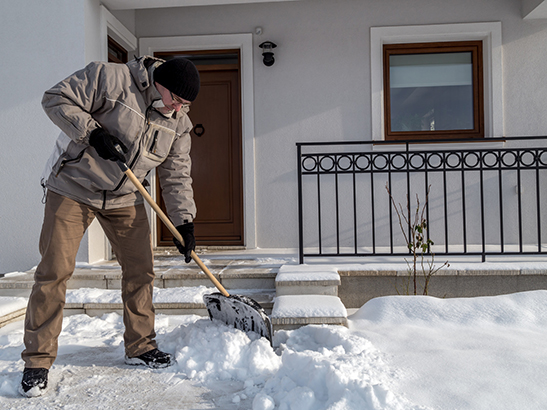Hypothermia occurs when the body cannot produce enough energy to keep the internal body temperature warm enough. Besides cold temperatures, high winds, snow and rain can rob the body of internal heat. Wind is especially dangerous because it removes the layer of heated air from around your body. Hypothermia symptoms include mental confusion, slowed reactions, lack of coordination, shivering and feeling sleepy. Elderly people and children are at most risk because they may not be able to understand what is happening and not realize they are in danger. Hypothermia can kill a person!
People who live a sedentary lifestyle often experience chest pain when shoveling snow or participating in other exertional outdoor activities. Sometimes, walking through heavy, wet snow is enough to put a strain on the heart. Also, the stress of pneumonia and other respiratory illnesses often further stress the heart. If you feel chest pain or pressure with exertion, especially if it is worsened by cold weather, please check it out. As the old adage goes, it is better to be safe than sorry.
Follow these guidelines to minimize your risk of winter-related heart problems:
- Wear layers of clothing to trap air between layers to keep you warm when going outside. Wear a hat; heat can be lost through your head.
- Don’t drink alcoholic beverages before participating in strenuous outside activities because alcohol increases your sensation of warmth and will cause you to underestimate the extra strain on your cold body.
- Stretch or take a 5 to 10-minute slow walk before shoveling snow or participating in strenuous outdoor projects.
- Take frequent rest breaks so you don’t overstress your heart.
- Caffeine and nicotine put a burden on a stressed heart; don’t smoke or have a cup of coffee when taking rest breaks.
- Learn CPR. Provided immediately after sudden cardiac arrest; CPR can double or triple a victim’s chance of survival.
- When in doubt, call 911 and get yourself checked out.
Know your physical limitations and listen to your body when shoveling snow or doing any type of outside physical activities. If in doubt, hand the snow shovel to your kids. You can supervise from the window.
Take our free online heart health assessment today.





